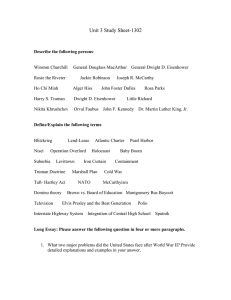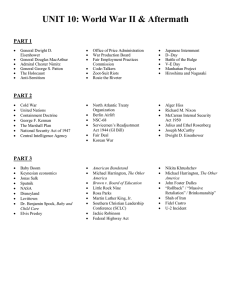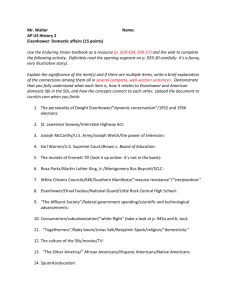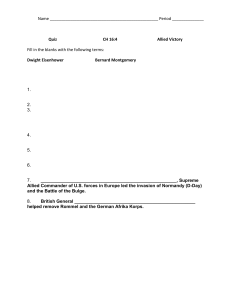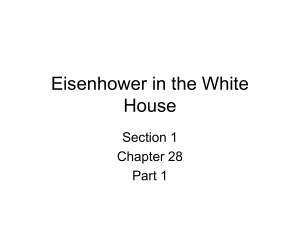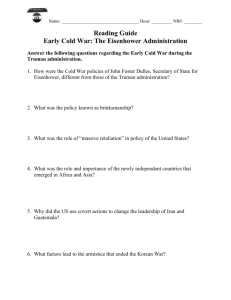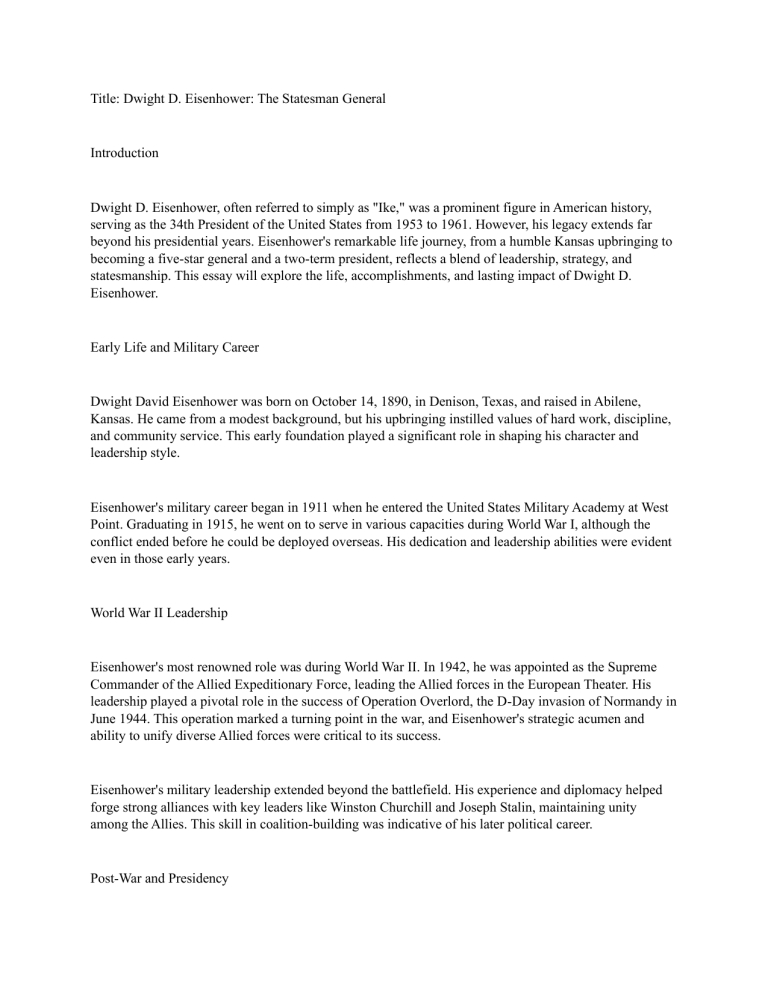
Title: Dwight D. Eisenhower: The Statesman General Introduction Dwight D. Eisenhower, often referred to simply as "Ike," was a prominent figure in American history, serving as the 34th President of the United States from 1953 to 1961. However, his legacy extends far beyond his presidential years. Eisenhower's remarkable life journey, from a humble Kansas upbringing to becoming a five-star general and a two-term president, reflects a blend of leadership, strategy, and statesmanship. This essay will explore the life, accomplishments, and lasting impact of Dwight D. Eisenhower. Early Life and Military Career Dwight David Eisenhower was born on October 14, 1890, in Denison, Texas, and raised in Abilene, Kansas. He came from a modest background, but his upbringing instilled values of hard work, discipline, and community service. This early foundation played a significant role in shaping his character and leadership style. Eisenhower's military career began in 1911 when he entered the United States Military Academy at West Point. Graduating in 1915, he went on to serve in various capacities during World War I, although the conflict ended before he could be deployed overseas. His dedication and leadership abilities were evident even in those early years. World War II Leadership Eisenhower's most renowned role was during World War II. In 1942, he was appointed as the Supreme Commander of the Allied Expeditionary Force, leading the Allied forces in the European Theater. His leadership played a pivotal role in the success of Operation Overlord, the D-Day invasion of Normandy in June 1944. This operation marked a turning point in the war, and Eisenhower's strategic acumen and ability to unify diverse Allied forces were critical to its success. Eisenhower's military leadership extended beyond the battlefield. His experience and diplomacy helped forge strong alliances with key leaders like Winston Churchill and Joseph Stalin, maintaining unity among the Allies. This skill in coalition-building was indicative of his later political career. Post-War and Presidency After World War II, Eisenhower served as the Chief of Staff of the United States Army, where he played a crucial role in transforming the military to meet the challenges of the Cold War. His leadership abilities caught the eye of the American public, and he was persuaded to run for the presidency as a Republican in 1952. Eisenhower's presidency, from 1953 to 1961, was marked by his moderate conservatism, his commitment to fiscal responsibility, and his dedication to civil rights. He signed the Civil Rights Act of 1957, which was the first federal civil rights legislation since Reconstruction. Additionally, he embarked on major infrastructure projects, most notably the creation of the Interstate Highway System, which transformed American transportation and had lasting economic benefits. Eisenhower's "Eisenhower Doctrine" aimed to contain the spread of communism in the Middle East. He also navigated the early years of the Cold War, including the Korean War, with a balanced and calculated approach that prioritized diplomacy over excessive military action. Legacy and Conclusion Dwight D. Eisenhower's legacy is multifaceted. He was a distinguished military leader, an effective diplomat, and a two-term president during a critical period in American history. His ability to bridge divides and bring people together, whether in wartime or peacetime, defined his leadership style. His farewell address famously warned of the "military-industrial complex," a prescient caution against the undue influence of defense contractors on government decisions. Eisenhower's legacy continues to influence American politics and military strategy. His emphasis on diplomacy, fiscal responsibility, and infrastructure development remains relevant in today's political discourse. Moreover, his leadership during World War II serves as a testament to the power of collaboration and unity in times of great adversity. In conclusion, Dwight D. Eisenhower was a statesman general who made enduring contributions to both the military and political spheres of American life. His leadership, characterized by integrity, humility, and a commitment to the common good, continues to inspire generations of leaders and citizens alike. Eisenhower's remarkable journey from a Kansas farm to the White House stands as a testament to the American dream and the power of leadership in shaping the course of history.
